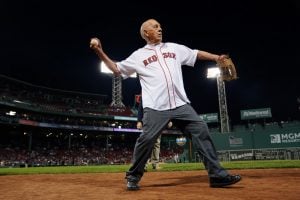Interview with ESPN founder Bill Rasmussen
Bill Rasmussen, Founder of the sports cable network ESPN, revealed this past summer that he was diagnosed with Parkinson’s disease (PD) in 2014 at the age of 81. Since his announcement, he has been determined to spread his dual message of awareness and optimism. Recently, he sat down with Dr. Rebecca Gilbert to share his story.
Could you share with us a little about yourself and how your diagnosis affected you?
All my life, I have been an entrepreneur. In the middle of 1962, I decided that I was going to go into the radio/television business. I started in radio and then got involved in play-by-play broadcasting for hockey, football, basketball and other sports. In the late 1970s, as cable television was beginning to rear its head and become a factor in what was happening in the world of television, I started a company called ESPN, which many people will have heard of.

(Photo by Melissa Rawlins / ESPN Images)
ESPN just celebrated its 40th anniversary on Sept 7. We first went on air back in 1979, and I worked with ESPN as an active employee and a consultant for a number of years until it was sold in the mid-80s. I kept a close association with them, even after it was sold, and I have really enjoyed that.
In 2014, I was diagnosed with Parkinson’s. I eventually moved to Seattle, where I live now with my daughter, who is a nurse of 30-plus years.
More recently I have been meeting with several people here in the Northwest who work in the Parkinson’s arena because I would like to contribute in some fashion to the awareness of Parkinson’s — to help spread the word. I have always had the impression that Parkinson’s is a quiet disease. People don’t like to talk about it for some reason. So I’ve been talking to the folks at ESPN and we are brainstorming some ways to raise the awareness. I think by raising awareness, we can raise not only more interest, but more money for research and I believe that we can solve PD someday.
At the moment, I’m still doing fine. I’m moving every day, still speaking, still active. To celebrate the anniversary of ESPN, I did a ten-day tour around the country! I’m an optimist and think I’m going to live to be 100.
Why do you think people are quiet about Parkinson’s?
My first impression was that it’s an embarrassment for people. I have seen a lot of people – unconsciously perhaps – put their hand [that is tremoring] in their pocket or under the table. I was speaking at a college a couple of years ago and they videotaped it. My left hand was shaking. I hadn’t told anyone that I had Parkinson’s at that point. I thought I was keeping it out of sight. And then I saw the video – and it was very clearly evident to anyone in the audience [that I had a tremor]. And nobody said anything to me about it. Why wouldn’t anyone say “are you OK?” Obviously, they knew something was going on, but they didn’t say anything. And I thought that was unusual. So I started talking to our PR folks at ESPN and last summer, we put the story out that I had Parkinson’s disease.
So my mission at this point is to spread the message – why be embarrassed? Seek help. Let’s see what we can do to make life better. I’m very optimistic about life. And we are not going to get anything done if we don’t talk about it.
When you went public with your diagnosis, what kind of reactions did you get?
It’s been very positive. Many, many people came forward from all over the world and have said in effect “thank you” for going public, raising awareness, and for saying “let’s do something”. The announcement is still on ESPN.com.
You mentioned that you are doing well and that you are very active and engaged. Are there any days that are more challenging than others? And if so, how do you stay positive on those days?
Sometimes, my body is not as positive as my brain. I wake up thinking I want to do all of these things – to exercise, to walk. But sometimes I can get out of kilter. When that happens, I say “this is going to be a tough day” and I reframe my mindset and take a new approach to that day and instead of my original plan I might sit down and read a book, to take my mind off of it.
When I went on that ten-day tour for ESPN, I was able to throw out the first pitch at Fenway Park before a Red Sox-Yankees game. I want to encourage people. People with PD can do these kinds of things. PD isn’t the end of the world.
There is a gentleman with PD whom I have met here in Seattle who is playing in a senior softball league tournament this weekend. That’s pretty good stuff! We all ought to do that. Keep focus on the sunny side of life instead of letting yourself fall into doom and gloom. Somedays my tremor is worse, or I get tired – I can’t tie my own tie anymore – but giving up is not an option and I choose to live a positive life.
We heard that before you threw out the pitch, you were practicing. How did you get geared up for that?

This is the third time that I have done this before a game. I played baseball for years so I know how to throw, but my muscles seemed to have changed their mind about how far I can throw. So I exercised and I started pitching two months before. And then when we got to Fenway Park, the Red Sox were kind enough to let us go down on the field and play catch.
Everyone was kidding me because I am a Yankees fan and I was wearing a Red Sox shirt!
I hear that you are in an APDA PRESSTM program? Can you tell us how that’s going?
I am an outgoing kind of a guy and I like to meet people. I am enjoying meeting everyone at the weekly PRESS meetings and talking with everyone. I’m trying to be very positive in all of the discussions. I have several allies in this, especially the fellow I mentioned who is playing in the softball game. I think by sharing stories and working together, we can help everybody. So far in the first two weeks of the program, I think that has been very evident.
Note to readers: PRESS is an eight-week psychosocial support group for people who have been diagnosed with PD within the past five years.
What do you want to get out of the PRESS program for yourself?
I’m always looking for new thoughts and if someone comes up with something that helps me, I think that’s great. And I want to help others. We are trading ideas about life with PD which stimulates a lot of conversation.
What would be your biggest piece of advice for someone with PD?
Some people hear the word Parkinson’s and they think “life’s over. I can’t do anything else” And that’s far from the truth. Don’t let your brain say “that’s the end. I can’t do anything”. Let your brain take the challenge and say “now what can I do?” What do I have to change so I can continue to live a healthy and positive life? Giving up is not an option and I think a positive attitude is what counts.
Also – ABC – Always Be Curious! Educate yourself, ask questions. And, NBC – Never Be Complacent!
Do you feel that your career has helped prepare you for the challenges of PD?
Absolutely. To be an entrepreneur, you have to have a very positive attitude because there are a lot of “no’s”. When we were starting ESPN for example, a number of people said that it would never work and now of course football, baseball, hockey, soccer – every sport you can imagine and a few that I can’t even imagine – are on television. And that positive attitude is helping me now.
We’ve talked a bit about exercise and staying active, but how important is exercise for you and your Parkinson’s symptoms? Do you notice a difference if you do not exercise?
Absolutely. I’ve always been a runner. I have always exercised and played sports. So I’m used to exercise. I’m used to being active. When you are tired and you get up and exercise anyway, you feel pretty good. I try to walk every day. [If I miss a day of exercise] I almost instantly feel muscle tightness.
I did fall twice early on in my diagnosis. At that point I thought – I have to learn to pay much more attention when I go up and down the steps. If I have a day when I am not feeling on top of my game, I pay extra attention to going up and down the stairs because I know that I could fall and I don’t want that to happen.
Anything to add about your PD experience?
It’s been about five years since my diagnosis and I have noticed that my left hand is tremoring a little more than it used to, but so far, other than being really careful when I go up and down stairs and being diligent about the exercise, I haven’t noticed much difference.
I do take time during the day if I am tired to take a nap or just lay down for a little while, but other than that, I am still planning to charge ahead with life.
I think awareness is the key. Let’s face everything head on, be positive and go forward. As I said, I am the eternal optimist. I want to be able to reach out to people and say “let’s go do this together”.
I don’t know how many people out there are undiagnosed but if we can help them by raising awareness, that would be great.
I’m going to be healthy for as long as I can. The more I talk about Parkinson’s – the more I want to continue to talk about it and bring my message to the entire Parkinson’s community.
We are grateful to Bill for sharing his story and his contagious optimism. If you are interested in the APDA PRESS program or attending any other APDA support group or program, please visit www.apdaparkinson.org/community to find the APDA Chapter or Information & Referral Center near you, or call us at 800-223-2732.
